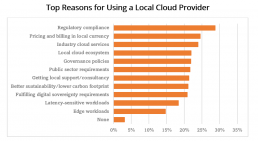Digital sovereignty is the main advantage of using local, as opposed to global, cloud providers for more than a fifth of organisations in Europe.
However, this ranks far below other benefits.
According to our Multicloud Survey 2021, regulatory compliance was the top reason for 29% of respondents, followed by pricing and billing in local currency (25%) and industry cloud services (24%), among others.
So, who cares about digital sovereignty?
Interest here has so far been limited mainly to public sector organisations, as well as some financial and retail sector customers.
But the topic of digital sovereignty is frequently starting to come up in conversations we’re having with both technology providers and technology buyers.
In our Worldwide CEO Survey, conducted in January 2022, 80% of organisations in Europe considered digital sovereignty to be their highest priority (alongside diversity and inclusion).
All this is being partly fuelled by growing political concerns about data sovereignty and cloud usage in Europe.
Just last month, for instance, the European Data Protection Board announced the launch of coordinated actions across the EEA to investigate public sector cloud usage.
All this is leading to greater interest in sovereign solutions for both providers and users, and IDC believes that the next cloud that organisations might add to a multicloud strategy is going to be a sovereign cloud for certain workloads and datasets.
In a recent European Future Enterprise Resilience and Spending Survey, IDC found that 40% of enterprises will include digital sovereignty requirements in their RFPs by 2024.
We predict they will choose to adopt cloud services from providers that adhere to digital sovereignty principles to increase customer, partner and government trust in their organisation.
Furthermore, 57% of our respondents agreed that digital sovereignty helps prevent unfair competition in digital markets and encourages rules-based ecosystem partner cooperation.
Buyer Expectations
The relatively new concept of cloud data sovereignty is still in its evolutionary stages where users are only just starting to understand all the implications it will have on their cloud strategies.
Defining what sovereignty actually means from the outset is vital if buyers are able to make informed decisions based on standardised comparisons of vendor offerings.
There are several facets to consider here as digital sovereignty and data sovereignty are not one and the same thing, and the concept of a “trusted cloud” does not automatically mean a sovereign cloud.
Savvier enterprise users are becoming aware that all clouds are not the same, with those in regulated industries in particular recognising that the right data must be deployed to the right cloud/venue.
This results in a multicloud scenario with organisations needing to identify the best locations for their workloads and applications.
Enterprise users that have a less mature approach to digital transformation and cloud are likely to need greater guidance from their partners here in all this.
Costs will also be top of mind for users considering sovereignty.
Our research has found that 60% of organisations in Europe “agree” or “strongly agree” that digital and data sovereignty increase the cost of doing business globally.
At a time when IT budgets are constrained and organisations want to make IT investments count, organisations may prefer to dedicate resources to more productive and tangible outcomes.
But they should be steered towards looking at sovereignty more positively and in a wider context that encompasses data protection, security, resilience and compliance.
Many of the big-name cloud providers operating in Europe have different approaches to meeting their customers’ digital sovereignty needs.
What’s important for users to realise is that the implementation of digital sovereignty principles is a long-term process and involves adapting to new IT requirements in terms of infrastructure, strategy, governance framework and skills.
All of these therefore become key criteria for cloud selection.
Look out for IDC’s forthcoming Market Perspective report to find out more about digital sovereignty and what it means for Europe’s cloud markets.
To learn more about our upcoming research, please contact Rahiel Nasir, or head over to https://www.idc.com/eu and drop your details in the form on the top right.


